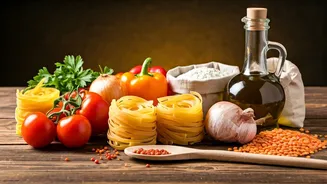Smart Grocery Shopping
Grocery shopping is the first step towards creating budget-friendly meals. Start by making a detailed grocery list. This avoids impulse purchases. Before
heading to the store, check your pantry and fridge to see what ingredients you already have. This minimizes duplicate buying. Comparing prices among different stores and brands is also essential. Generic brands often offer similar quality at a lower cost. Additionally, consider buying in bulk for non-perishable items like rice and beans, as this can lead to substantial savings over time. Embrace seasonal produce, as it's typically cheaper and fresher. Finally, resist the urge to shop when hungry, as you're more likely to overspend on unhealthy impulse buys.
Master Meal Planning
Meal planning is the cornerstone of budget-conscious cooking. Set aside some time each week to plan your meals. Start by looking at your schedule and identifying days you'll have extra time for cooking. Choose recipes that use similar ingredients, so you can buy in bulk and minimize waste. For instance, if a recipe calls for carrots, select other recipes that include carrots. Use online resources, cookbooks, and your personal favorites to gather ideas. Then, create a meal plan for the entire week, specifying each meal. When you have a plan in place, write a detailed grocery list based on your recipes. This will keep you focused and prevent unnecessary purchases. Meal planning also reduces food waste because you use all the ingredients you bought. Planning ahead allows you to take advantage of sales and promotions at the grocery store.
Creative Ingredient Utilization
One of the keys to economical cooking is maximizing the use of your ingredients. Learn to use all parts of your fruits and vegetables. For instance, vegetable scraps can make flavorful broth. Leftovers are your friend; transform them into new meals. Roast leftover chicken and use it in salads, sandwiches, or soups. Get creative with what you have. A simple can of beans can become a hearty chili, tacos, or a bean salad, depending on what seasonings and other ingredients are used. Experiment with substitutions. If you're out of a particular ingredient, find a suitable replacement. For example, if you don't have fresh herbs, use dried herbs. Seasoning is essential. Use herbs, spices, and sauces to give your dishes a great flavor. This is particularly important for budget cooking because it adds interest without adding significant cost.
Budget-Friendly Recipes
Several recipes are naturally budget-friendly and offer fantastic value. Consider dishes based on staples such as lentils, beans, and rice. These are inexpensive and can be used in many different ways. Lentil soup, a simple rice and bean combination, or a spicy bean chili are great options. Pasta is also a budget-friendly option. It is great because it can be combined with numerous sauces and ingredients, making it versatile. Use fresh produce in season. It is more affordable than out-of-season produce. A simple roasted vegetable dish with olive oil, salt, and pepper can be a delicious and satisfying meal. Incorporate eggs. They are a good source of protein and can be used in many dishes, such as omelets, frittatas, and quiches. Focus on the main ingredients and build around them.
Food Storage Tips
Proper food storage is essential for extending the life of your groceries and reducing food waste. Learn the best way to store each food item. Store fruits and vegetables properly. Keep fruits like bananas and avocados on the counter until ripe. Berries should be washed before consumption and stored in the refrigerator in a container lined with paper towels to absorb excess moisture. Store meat properly. Keep raw meat, poultry, and seafood in the coldest part of your refrigerator. Freeze any items you don't plan to use within a few days. Using airtight containers is another storage best practice. This helps prevent freezer burn and keeps food fresh longer. Take advantage of your freezer. It is a great resource. You can freeze leftovers, cooked dishes, and even individual ingredients like herbs and vegetables to prevent them from going bad.
Embrace Leftovers
Leftovers are an excellent tool for budget-conscious cooking because they provide a second meal from your initial investment. Plan for leftovers when cooking. Make large batches of meals you can eat for a few days. This saves time and money. Properly store leftovers by refrigerating them quickly after cooking. Make sure to use airtight containers to maintain freshness and prevent bacterial growth. Get creative with leftovers. Turn roast chicken into chicken salad or tacos. Use leftover rice as a base for a stir-fry. Repurpose ingredients. Turn leftover vegetables into a frittata or soup. Utilize various cooking methods, such as reheating, to make the most of your leftovers. Don't be afraid to experiment to come up with new, creative dishes using your existing ingredients.












